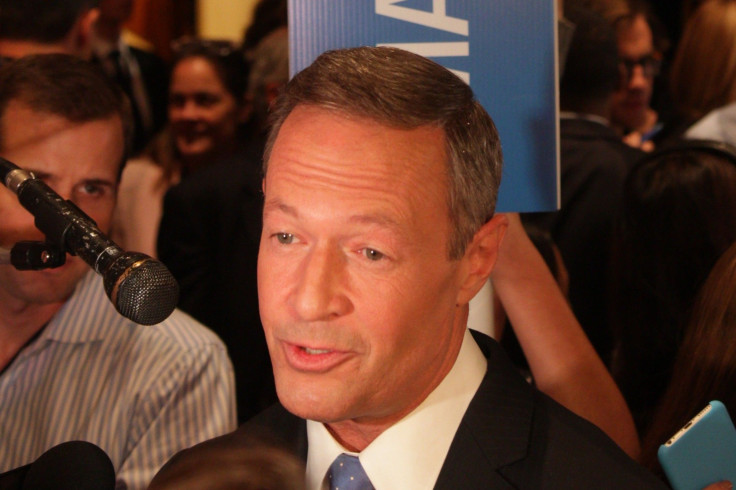
If you want to know what pro-immigrant voters are looking for in a presidential candidate, read former Maryland Gov. Martin O’Malley’s 8-page immigration plan. It reads a laundry list of immigrant activist demands, and goes far beyond the comparatively timid pledges of O’Malley’s democratic primary rivals, Sen. Bernie Sanders (I-Vt) and former Secretary of State Hillary Clinton. Healthcare for undocumented immigrants, an overhaul of the U.S. Border Patrol, enshrining sanctuary cities, erasure of punitive immigration laws, and an end to Obama’s Priority Enforcement Program.
That advocacy has won O’Malley the praise of leading voices in the Latino community, including Hispanic Chamber of Commerce CEO Javier Palomarez, who sounded off on the immigration to to MSNBC’s Chris Hayes on Thursday.
“Frankly, the best plan I’ve seen -- and I’ve had plenty of time to speak to all of the candidates -- is from Martin O’Malley,” Palomarez said. “He has put forward a robust plan for how we move forward, and how we begin to fix this immigration system that’s been broken for some time now.”
All three top Democratic candidates agree on a pathway to citizenship for the 11 million immigrants in the country illegally, and want to create outreach programs to increase citizenship rates among permanent residents. Yet O’Malley’s plan goes even further, and gets into specifics
For example, he proposes eliminating 3-to-10-year bars on green card applications, an automatic punishment currently imposed on immigrants caught in the country illegally. He’s also offered an overhaul of the scandal-ridden Border Patrol, and changing a key element of the immigration courts: access to attorneys.
Unlike criminal defendants, immigrants facing deportation don’t have access to lawyers. Those who can’t afford an attorney or fail to court pro bono representation face an overwhelming disadvantage in the legal system.
Immigrant advocates have criticized Clinton for supporting the expedited removal of unaccompanied minors without legal representation. She’s since backpedaled on those statements somewhat, characterizing the influx of unaccompanied minors in 2014 as a unique “crisis.”
“I think they certainly deserve lawyers to make their case for asylum for them,” O’Malley said of unaccompanied minors, speaking to the Latin Times in September at a campaign event in Los Angeles.
His plan was released in July. You can read it here.
Palomarez wasn’t the first Latino influencer to sound off on O’Malley’s plan. Latino Rebels listed O’Malley’s immigration plan in an article describing him as the candidate that had “taken the lead on Latino issues.” Jorge Ramos even gave it a nod.
@MartinOMalley released the most inclusive immigration plan so far. Includes healthcare for undocumented immigrants. https://t.co/Xcv1SNfaYf
— JORGE RAMOS (@jorgeramosnews) July 14, 2015However, some of O’Malley’s proposals might meet the very definition of pandering, in that they seek to satisfy demands of a particular group without being reasonable (not in the sense that they are insincere).
Take the idea to expand Obamacare subsidies to immigrants in the country illegally. Such a proposal would validate the as-of-yet unjustified fears of nativists, further eroding support for comprehensive reform.
But at least the former Governor's proposals are clearly spelled out.
By contrast, former Secretary Clinton barely mentioned immigration on her website until a month ago, when her team expanded her immigration page to four comparatively vague bullet points, just in time for Hispanic Heritage month.
While Clinton has expanded on those answers in interviews, her pledges have been nonspecific. On one hand, this may be a strategy to help her competitiveness in the general election; to reduce the amount of fodder available to a hypothetical Republican opponent. On the other hand, lack of specificity has turned of the press and emboldened immigration activists.
O’Malley, 52, has said himself that he’s running “to offer a generational alternative.” But can O’Malley’s idealistic, pro-immigrant policies also offer a winning alternative? Let us know what you think in the comments below.
© 2025 Latin Times. All rights reserved. Do not reproduce without permission.




